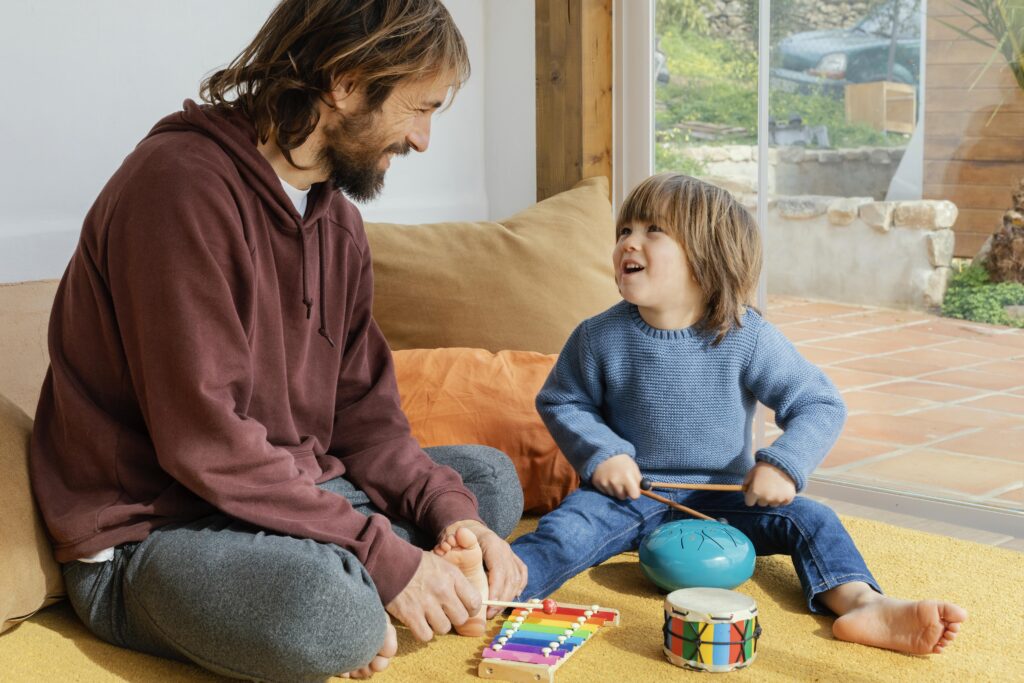Starting a co-parenting path after an LGBT divorce comes with a set of special difficulties as varied as the rainbow. While ending a relationship or marriage is tough for anybody, LGBT families may face extra challenges because of the complicated web of social, legal, and emotional ties that surround them. It’s a route paved with difficulties of its own, but it may also lead to a terrain of comprehension and development, particularly for the kids at the center of it all. Understanding the subtleties of LGBT family law and the emotional terrain of these kinds of changes is essential. This essay seeks to shed light on such difficulties and provide helpful, considerate guidance for creating a cooperative co-parenting atmosphere, rather than just recognizing them. Our goal is to provide the love, support, and stability needed to help children who are caught up in the wake of change on their journey ahead.
Co-parenting’s Central Component: Communication
Strong and honest communication is essential for any co-parenting relationship to succeed, but it’s particularly important after an LGBT divorce. LGBT divorce has a special set of difficulties, but keeping open lines of communication amongst co-parents may make the process much easier for all parties—most notably, the kids.
-
The Value of Honest Communication
The basis of mutual trust and understanding among co-parents is open communication. To make sure that all sides feel heard and respected, it’s essential to develop the practice of having courteous and honest conversations. Frequent meetings, either in person or virtually, may assist maintain both parents’ alignment on a range of issues pertaining to their child’s upbringing. Regular check-ins guarantee that choices pertaining to the well-being of the kid are made in a respectful and cooperative manner.
By bridging gaps, technology may also make regular communication less obtrusive and more tolerable. Schedules can be managed, crucial information can be shared, and financial transactions can be made easier using co-parenting apps that keep communication clear and kid-centered.
One important factor in these discussions is the language that is employed. Using neutral, straightforward language, particularly when talking about delicate subjects, helps avoid misunderstandings and defuse awkward situations. This strategy promotes a problem-solving mentality by directing attention away from personal complaints and onto the current situation.
-
How to Handle Tough Conversations
Even with the greatest of intentions, uncomfortable talks can always arise. Conflicts over parenting philosophies, curriculum selections, or way of life adjustments may arise, putting the co-parenting relationship to the test. In these kinds of circumstances, it’s critical to approach conversations with empathy, making an effort to comprehend the other person’s point of view while articulating your own.
When reaching a consensus appears impossible, getting outside assistance via therapy or mediation may provide a neutral platform for discussion. Experts in LGBT divorce and co-parenting matters may provide direction, assisting in the constructive navigation of these discussions. In addition to helping to settle the current conflict, this assistance fortifies the co-parenting relationship by fostering resilience in the face of future difficulties.
Recall that the purpose of communication in co-parenting is to create an atmosphere where your kid may flourish in spite of the changes in their family structure, not to win an argument. Co-parents may negotiate the aftermath of an LGBT divorce with grace and mutual respect, laying a solid foundation for their child’s future by emphasizing open communication and asking for assistance when necessary.
Legal Aspects and Limitations
Navigating the legal terrain of co-parenting after an LGBT divorce might feel overwhelming. To facilitate a seamless transition for all family members, it is important to carefully evaluate the nuances of custody arrangements and child support. In order to avoid future miscommunications and disputes, it is critical to establish clear legal limits, which is why having an experienced LGBTQ family lawyer on staff is essential.
The foundation of post-divorce parenting plans are custody agreements, which specify each parent’s rights and obligations with relation to their children. These agreements need to be all-inclusive, addressing not just physical custody but also legal custody, which includes the power to make decisions on a child’s education, medical treatment, and other important areas of their life. In spite of their separation, a balanced agreement guarantees that both parents take an active role in their child’s development.
To equally distribute financial duties for the kid’s wellbeing, child support is another crucial topic. A fair amount may be difficult to determine since it depends on a number of variables, including the child’s requirements, custody agreements, and income levels. An LGBTQ family lawyer can promote transparent conversations that can lead to the creation of a just and long-lasting support plan.
It is essential to get legal advice from a lawyer who focuses in LGBTQ family law. Such a professional is aware of the social and emotional issues at play in addition to the legal subtleties unique to LGBTQ divorces. They may provide advice that is customized to your family’s particular circumstances, making sure that all contracts are fair and considerate of the interests of all parties involved in addition to being in compliance with the law as it is today.
To put it simply, negotiating the legal side of co-parenting calls for a delicate balancing act between knowledge, sensitivity, and foresight. Co-parents may create a stable and nurturing environment for their children after a divorce by setting clear legal limits and consulting with an LGBTQ family lawyer.
Establishing a Coordinated Parenting Front
Building a united front is essential to the co-parenting process, particularly after an LGBT divorce, since it supports the child’s feeling of security and wellbeing. This cohesion is essential for both the practical elements of parenting two families as well as for providing emotional support. Here’s where celebration and constancy come into play.
-
Uniformity Throughout Families
One cannot stress the importance of maintaining regularity in routines, norms, and discipline. A constant set of expectations gives kids a feeling of security and consistency when they change houses. Co-parents may do this by harmonizing their rules and parenting philosophies, making sure that expectations for schoolwork, bedtime routines, and disciplinary actions are comparable, if not the same, in both houses. This continuity lessens the uncertainty and fear that kids may experience when adjusting to life after a divorce. Frequent planning meetings and conversations between co-parents, maybe led by an LGBT family law attorney, can help resolve conflicts and provide a stable environment for the kid.
-
Honoring Significant Occasions Together
Co-parents may put up a unified appearance even though they live apart by getting together to commemorate their child’s important life events. Milestones such as birthdays, graduations, school plays, and others provide parents a great chance to put their disagreements aside and concentrate on their common love for their kid. Together, these festivities strengthen the child’s feeling of family and provide an example of how relationships may improve after a divorce. Being there with both parents to encourage and applaud their accomplishments gives a strong message of unwavering love and support. This strategy emphasizes the significance of giving the child’s emotional and psychological well-being first priority through all the upheavals life may bring, and it is occasionally led by the insights of an LGBT family law attorney.
External Resources and Support Systems
After an LGBT divorce, co-parenting may be a wonderful and stressful experience. The creation of a strong support system is essential to effectively negotiating this route. In addition to friends and family who can give practical help and emotional support, this network should also include experts who can offer specialized advice and support.
Family and friends are priceless; they may provide a helping hand, a listening ear, and even a much-needed diversion. They serve as the first line of defense against the loneliness that might result from significant life transitions. It is imperative, nonetheless, that this network be expanded to include services and experts who are accepting of the LGBT community.
Support groups designed with LGBT parents in mind may be really helpful. It is difficult to find a feeling of understanding and community elsewhere, but these organizations provide it. Here is where deep insights and personal development may result from exchanging experiences, counsel, and resources with others who have traveled comparable routes. Counseling services that are knowledgeable about the subtleties of LGBT family relations may also provide customized guidance to assist people and families in making positive, healthy adjustments to their new circumstances.
Co-parenting after an LGBT divorce is undoubtedly a difficult road, but it can also be one of development, resiliency, and strengthened relationships if the correct support network is in place. Co-parents may provide their kids with a secure, caring, and encouraging environment by relying on both personal networks and specialized outside resources, opening the door to a better, more cohesive future.
Prioritizing the Child’s Well-Being
In the aftermath of an LGBT divorce, the well-being of the child must take precedence. This complex transition requires more than just logistical arrangements; it demands emotional intelligence and a deep commitment to nurturing the child’s emotional and psychological health.
-
Emotional Support and Listening
Central to a child’s adjustment during and after divorce is the assurance that their feelings are valid and important. Creating a safe space where they can express their emotions without fear of judgment or dismissal is crucial. This might mean setting aside specific times for open conversations or encouraging them through art, music, or writing to articulate their feelings.
Responsive parenting—where you actively listen and then address your child’s concerns—can significantly ease their anxiety. It’s about recognizing the signs of stress or discomfort and offering comfort and assurance tailored to their needs. During this transition, children need to feel secure and understood, with the freedom to express love for both parents without guilt or pressure.
Consulting a child custody lawyer who is sensitive to the nuances of LGBT family dynamics can also provide guidance on legal and emotional support frameworks that protect the child’s interests.
-
Inclusive Environment and Education
An inclusive home environment, one that celebrates diversity and educates about different family structures, fosters resilience and acceptance in children. Emphasizing the value of love and respect in all relationships, regardless of their form, helps children embrace their family’s uniqueness positively.
Parents can introduce books, movies, and activities that reflect diverse family models, encouraging questions and discussions. This educational approach nurtures an open-minded and accepting perspective, equipping children to navigate their social worlds with confidence and empathy.
Moving Forward with Positivity
Looking ahead, co-parents should cultivate a forward-thinking mindset, focusing on the opportunities that change brings. Personal growth, self-care, and a positive outlook are crucial for both parents and children during this period. Embracing new beginnings, while undoubtedly challenging, can also be a source of strength and renewal.
A constructive approach involves setting new goals, exploring interests, and finding joy in the everyday. Encouraging children to see change as a part of life that brings growth and new experiences can inspire optimism in them as well. Through example, co-parents can teach their children the value of resilience, adaptability, and the pursuit of happiness, even in the face of adversity.
This journey, guided by compassion, understanding, and an unwavering commitment to the child’s well-being, can lead to a healthier, more harmonious family dynamic post-divorce.













